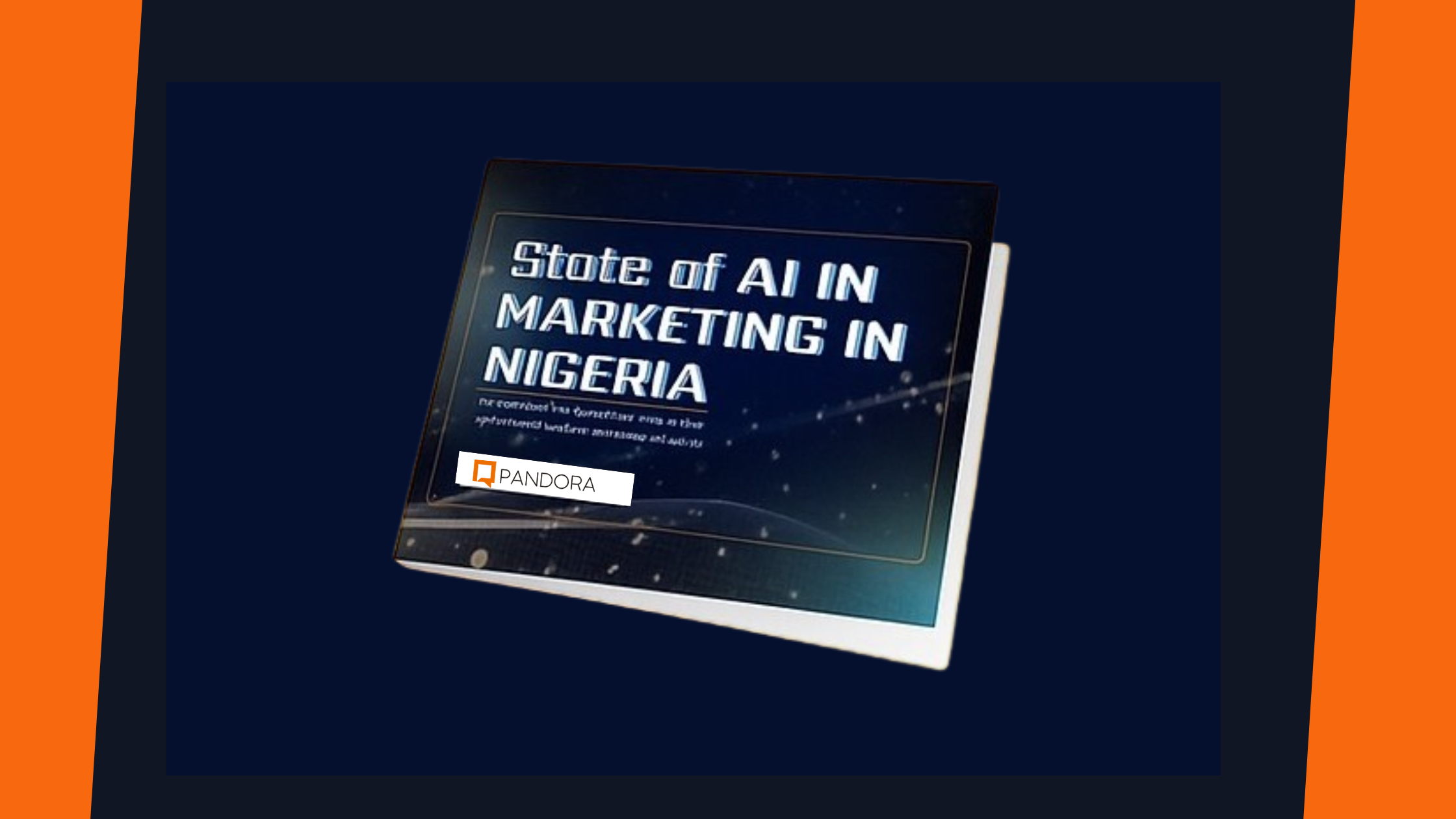In our first State of AI in Marketing in Nigeria report, over 100 professionals reveal how AI is shaping content, customer experiences, automation, and investment decisions, while also spotlighting real barriers Nigerian brands face today.
Artificial intelligence is playing a key role in modern marketing. But beyond the global headlines and the rise of tools like ChatGPT, what’s really happening on the ground in Nigeria? To find out, Pandora Agency Limited surveyed more than 100 marketing professionals and brand operators across Nigeria, spanning industries from banking to retail and roles from agency leads to founders. Our goal? To assess how AI is truly being adopted, applied, and viewed in Nigerian marketing today.
The result is a clear, data-driven look into what’s working, what’s not, and where the next big shift might happen.
Our report breaks down key responses across five core themes:
- Which AI tools Nigerian marketers use the most
- How they’re using them in real workflows
- What benefits they’re seeing
- The biggest challenges they face
- What they plan to invest in next
Whether you’re scaling a marketing team or just starting your AI journey, this report is built to help you navigate AI adoption confidently and contextually in Nigeria’s evolving digital economy.
5 Key Findings From the AI in Marketing in Nigeria Survey
1. AI Is Already Mainstream in Nigerian Marketing
A striking 83% of Nigerian marketers say they are already using AI-powered tools in their workflows. This adoption rate mirrors global trends and positions Nigeria as one of Africa’s frontrunners in AI integration, particularly in areas like generative content, customer insights, and chatbots. The most widely used tools include virtual assistants, AI-generated content platforms, and social media sentiment analysis solutions. Interestingly, most of these tools require little technical setup, and marketers are favoring plug-and-play solutions that offer instant productivity boosts.
While the enthusiasm is strong, Nigeria’s AI maturity is still developing. The Oxford Insights AI Readiness Index places the country in the “Medium” tier, indicating a hunger for innovation but persistent gaps in infrastructure, training, and governance.
2. Marketers Are Gaining Time, But Still Learning How to Win With AI
Productivity gains emerged as the biggest benefit of AI adoption in Nigeria. 75% of respondents said AI has helped them save time and increase output. Others cited improvements in decision-making and cost reductions. This is particularly crucial in a market where many brands work with lean budgets and compact teams. AI tools are lightening workloads by automating content creation, customer targeting, and performance tracking.
However, these tools aren’t magic bullets. While operational efficiency is improving, strategic gains like better campaign outcomes or stronger customer lifetime value remain elusive for many. This suggests AI is helping marketers work faster, but not necessarily smarter…yet.
3. Cost, Skills, and Trust Are the Biggest Roadblocks
Despite high usage rates, many Nigerian marketers are still navigating steep learning curves. The biggest obstacles to effective AI adoption are technical, structural, and cultural. Nearly half of the respondents identified a lack of knowledge or training as a major challenge, followed by the high cost of premium AI tools. Trust concerns, particularly around data privacy, also ranked high. This is especially relevant in sectors like advertising, where AI usage is actively restricted by the regulatory body, ARCON.
This tension reflects a broader industry dilemma: AI is seen as both a necessary innovation and a potential risk. Some professionals are urging caution, advocating for better training and ethical frameworks before companies dive too deep.
4. Nigerian Marketers Are Ready to Scale AI
The future of AI in Nigerian marketing is not just promising, it’s intentional. Eight out of ten marketers say they plan to increase their AI use or investment in the next 6 to 12 months. Unlike early dabblers, these marketers are thinking strategically. They’re exploring ways to automate lead funnels, personalize customer journeys, and optimize SEO using AI-enhanced data.
What’s especially noteworthy is the desired move from surface-level experimentation to deeper integration. Marketers want to shift focus from using AI as a novelty to embedding it into core business functions. Content creation, customer sentiment analysis, and performance marketing are the top areas they plan to expand with AI support.
5. Human Creativity Still Has the Final Word
One of the most powerful insights from the report is that Nigerian marketers don’t see AI as a replacement; they see it as an amplifier. While adoption is accelerating, professionals remain clear-eyed about the need for human oversight. Several respondents emphasized that AI should enhance creativity, not replace it. “Use AI to amplify your ideas, not to replace your thinking,” one marketer advised. Others stressed the importance of learning the tools before relying on them, reinforcing the idea that success with AI depends more on skill than hype.
This balanced mindset is likely to define Nigeria’s AI journey in the months ahead. Great marketers are curious, proactive, but cautious enough to avoid blind spots.
Nigeria’s AI in Marketing Adoption Requires Intention
The State of AI in Marketing in Nigeria 2025 report shows a country leaning into AI with optimism but not naivety. Adoption is widespread, tools are delivering real productivity gains, and most marketers plan to scale up usage. But challenges like affordability, data governance, and skill development remain.
As Nigeria continues to position itself among Africa’s AI leaders, the key to unlocking long-term value won’t be technology alone; it will be how well marketers combine AI capabilities with human insight, creativity, and local expertise.
Download the full State of AI in Marketing in Nigeria PDF report to explore more data, practical insights, and actionable recommendations.



Leave a Reply